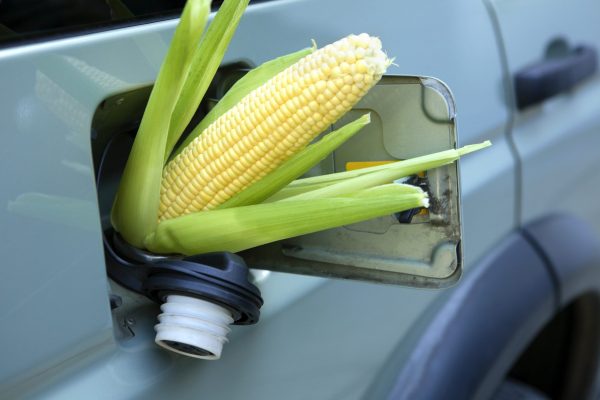Corn-based ethanol could harm climate more than gasoline, study shows

Published: March 29, 2022
Category: Industrial Agriculture Damage
A new study brings bad news about corn-based ethanol—a biofuel promoted by the U.S. Department of Agriculture as being relatively clean environmentally. The study, funded by the National Wildlife Federation and U.S. Department of Energy, showed that ethanol is likely to be at least 24% more carbon-intensive than gasoline—due primarily to land use in cultivating and processing the corn.
For years, ethanol has been mixed into gasoline sold at pumps. The 2005 U.S. Renewable Fuel Standard (RFS) mandated that U.S. oil refiners mix about 5 billion gallons of ethanol into gasoline each year to help reduce emissions, boost farm incomes, and slash U.S. dependency on energy imports. RFS resulted in corn production rising 8.7%, into 6.9 million additional acres between 2008-2016. The farming practices, such as tilling of new land, had an impact. Tilling releases stored carbon; more nitrogen fertilizer use also increased emissions.
“Corn ethanol is not a climate-friendly fuel,” said lead author Dr. Tyler Lark, at University of Wisconsin-Madison Center for Sustainability and the Global Environment.
The Renewable Fuels Association, ethanol’s trade lobby, slammed the study as “completely fictional and erroneous” with “worst-case assumptions [and] cherry-picked data.”
Although 2019 USDA research reported a 39% lower carbon intensity for ethanol due to carbon sequestration from more crops, that research underestimated the emissions effect from land conversion, Lark said.
USDA had no comment on this study; the U.S. Environmental Protection Agency is considering altering the program after 2022.
Source: Reuters
To view source article, visit:
https://www.reuters.com/business/environment/us-corn-based-ethanol-worse-climate-than-gasoline-study-finds-2022-02-14/
Organic & Non-GMO Insights April 2022








